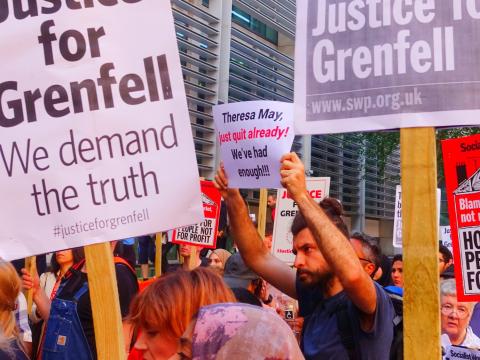The Grenfell Tower Inquiry

Source: Hazards magazine, http://www.hazards.org/votetodie/bluemurder.htm
Introduction
What follows is my response to the consultation by The Chair of the Grenfell Tower Inquiry, Sir Martin Moore-Bick, into its terms of reference, which will set out what the Inquiry will cover. The text that follows is an un-edited version of that submission, save for adding hyperlinks as references to this version. The submission aimed not to reproduce the details that would have been forwarded by other organisations with whom I have close working relationships, such as INQUEST and Hazards.
Grenfell Tower Inquiry: Terms of Reference
The Grenfell Tower Inquiry is designed to ascertain the causes of the tragedy, and to ensure that the appropriate lessons are learnt. With this in mind, and as a leading academic commentator on regulation and enforcement in the context of social regulation, not least with respect to occupational and public health and safety, it is my considered view that it is crucial that the Terms of Reference of the Public Inquiry take cognisance of three broad sets of issues within which many of the specific concerns that it will no doubt address must be contextualised. These are crucial not simply for understanding why the fire occurred, but also in preventing other multi-fatality incidents, since each of these contextual features continue to be in existence whilst some, notably cuts in Local Authority funding, are likely to become even more significant.
1. Anti-Regulation Rhetoric
The rhetorical undermining of the very idea of regulation and its enforcement, and thus of those men and women who undertake this work as a form of public service, which have contributed significantly to an anti-regulatory culture in the UK. This rhetorical under-mining has long been espoused through formal politics, and has seeped into popular consciousness, not least via repetition across all forms of broadcast and print media. It can be traced back some forty years but my specific concern is with the ways in which it has circulated through and seeped into political and popular consciousness in the past twenty years. Based on apocryphal tales, half-truths and sheer falsehoods, it undermines regulation and regulators, and thus makes social and public protection less likely with publics offered a very distorted view of what ‘health and safety’ means in practice with regard to protecting them, their families and their communities.
This Term of Reference might be captured thus:
The nature and effects of the long term pejorative rhetoric around regulation and its enforcement as ‘red tape’ as part of a broader anti-regulatory culture.
2. The ‘Better Regulation’ Initiative
The broad policy direction in terms of regulation and enforcement which spans some fifteen years at least in the UK and which can be subsumed under the rubric of the ‘Better Regulation’ initiative, which since 2004 has formally impacted upon all national and local regulators in the UK. This trajectory has drawn upon, and then contributed to, the anti-regulatory culture highlighted above (1.). Officially launched by a Labour Government, then maintained and developed both by the subsequent Coalition then Conservative Governments, this cross-party initiative contains a series of assumptions and constituent policy dynamics which are crucial to understanding the combination of policy decisions which produced a context within which the Grenfell Tower fire could occur.
This Term of Reference might be captured thus:
The nature and effects of Better Regulation in producing a policy context within which the fire at Grenfell Tower could occur.
3. The Absence of Credible Enforcement Capacity
The particular effects of funding reductions since 2008/09 both for national regulators and also for Local Authorities, not least in a context of the ‘Better Regulation’ policy initiative ( see 2., above), which has claimed that ‘less’ can and should be done with ‘more’. The specific dynamics of how funding reductions have, at both national and local levels, impacted upon regulation and enforcement is a crucial issue for the inquiry to consider, undermining as it does the idea of public protection and safety. Specifically, the Inquiry must address the extent to which, on the part of those regulatory services and bodies which have a statutory requirement to enforce laws for public and social protection against public bodies and private organisations, there remains any form of credible enforcement capacity.
This Term of Reference might be captured thus:
The nature and effects of the funding of national and local regulatory bodies and services upon public protection.
Further, Specific Considerations
These broader issues will provide some of the key context within which some of the more focussed considerations of the Inquiry will proceed, these including, but not exhausted by, the following:
The triggering event for the fire.
The history of the tower block, from inception and planning as a local authority housing development, to its commission, design, transfers of ownership, subsequent modifications, so on.
A consideration, since at least 2004, of the oversight of fire and health and safety regulations at Grenfell Tower and other tower blocks.
Complaints by and demands of residents of Grenfell Tower in relation to safety of the block in particular and its general maintenance and housekeeping issues in general, as well as responses to and actions following these by TMO and RBKC.
A review of all previous Coroner’s recommendations on fires in high rise residences, and an audit of actual responses to these recommendations.
Relevant, related governmental and / or parliamentary knowledge, response and oversight of recommendations and actions in response to those cases and relevant surrounding issues.
A consideration, since at least 2004, of the oversight of fire and health and safety regulations at Grenfell tower and other tower blocks.
The nature of the response to the fire and subsequent crisis by a variety of state bodies.
Steve Tombs, Professor of Criminology, The Open University
